|
|
|
Sort Order |
|
|
|
Items / Page
|
|
|
|
|
|
|
| Srl | Item |
| 1 |
ID:
151664
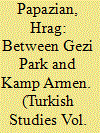

|
|
|
|
|
| Summary/Abstract |
This paper uses theories of intersectionality to study Nor Zartonk, an activist group of Istanbulite youths which is mostly comprised of Armenians. Based on ethnographic research, it first explores and analyzes the youths’ subjectivities, ideology, and activism, exposing their intersectional nature. Furthermore, through the study of this particular case the paper identifies some general potentials of intersectional positionality: first, that the politicization of one dimension of individuals’ intersectional subjectivities could pave the way for the politicization of others; second, that intersectional activists could ‘intersectionalize’ the events in which they participate, thus potentially pluralizing the socio-political implications of those; and third, that different dimensions of intersectional activism could support each other in practice and essence.
|
|
|
|
|
|
|
|
|
|
|
|
|
|
|
|
| 2 |
ID:
151661
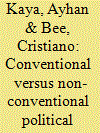

|
|
|
|
|
| Summary/Abstract |
This special issue focuses on the emergence of different forms of civic and political activism in Turkey. In doing so, we have taken into account different components of active citizenship and looked more specifically into the development of civic and political forms of activism that bridge the realms of conventional and non-conventional participation. As witnessed in many different contexts, conventional forms of political participation such as electoral politics are being replaced with non-conventional forms of participation that take place outside, and sometimes in opposition to, the more traditional channels of representation.
|
|
|
|
|
|
|
|
|
|
|
|
|
|
|
|
| 3 |
ID:
151667
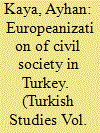

|
|
|
|
|
| Summary/Abstract |
As a clear depiction of unconventional forms of civic and political participation, the Occupygezi movement has revealed that a more comprehensive approach is needed to understand the deep socio-political drives underpinning the Turkish bid for EU membership. Focusing on three different framings, namely Euro-enthusiastic, Euro-sceptic and critical Europeanist frames, developed by civil society organizations in Turkey since the 1999 Helsinki Summit, this article will analyze the transformative effect of the Occupygezi movement on various civil society groups which had previously been Euro-sceptic. Subsequently, the article will claim that the critical Europeanist frame has recently become stronger. Methodologically, the article will be based on a literature survey on the civil society actors, as well as discourse analysis of some particular associations, trade unions and the media organizations in relation to their changing perception of the EU before and after the Occupygezi movement.
|
|
|
|
|
|
|
|
|
|
|
|
|
|
|
|
| 4 |
ID:
151665


|
|
|
|
|
| Summary/Abstract |
Based on ethnographic fieldwork conducted in Istanbul with participants of the Gezi Park Protests, this article studies how young people relate to the political. One of the most important priorities of this article is to discover new ways of thinking about young people and politics from a cultural perspective, and thereby rethink the notion of participation in relation to the political. Everyday life, values, and cultural practices are presented as lenses through which young people define the political. ‘Politics as doing’ emerges as the greatest commonality in the diverse definitions of the political, underlining the real, practical, and daily roots and effects of political action. Analyzing the diversity and overlaps within the differing perceptions and practices of the political by young people, this article underlines the need, and also possible ways, for thinking about youth political participation through new lenses.
|
|
|
|
|
|
|
|
|
|
|
|
|
|
|
|
| 5 |
ID:
151662
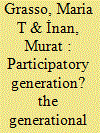

|
|
|
|
|
| Summary/Abstract |
This research aims to understand the extent to which generation and social class determine Turkish respondents’ level of political activism. It tests both the macroeconomic socialization effect and the social class effect on political activism as hypothesized by Inglehart and Lipset, respectively. It also strives to understand whether a macropolitical period effect may also some generational implications for political activism. Beyond these examinations, it also raises a challenge to Lipset’s working-class authoritarianism thesis – within the particular area of political activism – for those generations which came of age under an authoritarian politico-juridical order as well as for those which did not.
|
|
|
|
|
|
|
|
|
|
|
|
|
|
|
|
| 6 |
ID:
151669


|
|
|
|
|
| Summary/Abstract |
Numerous rallies, gatherings and occupations in public squares of large cities have occurred since 2010. They constitute a new guideline to new social movements, which embrace a transformation in public spaces through interaction, shared experience and art so that a collective energy is generated within a given context and time. They therefore propose an alternative form of acting and living together in the light of the equality of all individuals involved. The re-creation of this new active citizenship, both individually and collectively, is also highly connected with the appropriation of a performative repertoire of action within everyday life. This paper focuses on the active, yet unorganized participation of Turkish citizens across the country to the protestation and/or performance of the Standing Man. Standing still and silent offers thus a performative action, which has become collective through social networks. This unpredicted act has been a pioneer in terms of the transformation of a singular creative intervention to a collective performative action.
|
|
|
|
|
|
|
|
|
|
|
|
|
|
|
|
| 7 |
ID:
151663
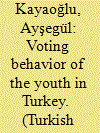

|
|
|
|
|
| Summary/Abstract |
The decline of conventional political participation of the youth is a serious concern in many countries worldwide. Studying the Turkish example, this paper aims to empirically analyze the determinants of youngsters’ (non)voting behavior. The analysis shows that lifestyle is the most important factor, reflecting the importance of the youth’s everyday practices on their conventional political participation. Besides, being female, having higher levels of education and residing in an urban area increase the probability of abstaining. Moreover, ‘economic voting’ exists for youngsters as they are found to be punishing the ruling Justice and Development Party (AKP) for economic prospects unpromising either individually or societally. For first-time voters, lifestyle and the 2013 Gezi protests are the main determinants of voting behavior. Furthermore, there is persistence in abstaining from voting as having abstained in the 2011 general elections increases the probability of abstaining again by 18 percent. The analysis of disillusioned youth demonstrates that Gezi protests have increased the probability of their conventional political participation; they can be associated either with a decline in their probability of voting for the AKP, or of being indecisive and/or abstaining. A factor change analysis, however, finds that the abstained and indecisive Kurdish youth’s preferences have shifted towards pro-Kurdish Peace and Democracy Party post-Gezi.
|
|
|
|
|
|
|
|
|
|
|
|
|
|
|
|
| 8 |
ID:
151666
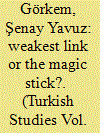

|
|
|
|
|
| Summary/Abstract |
This article summarizes the first part of the findings of a larger study which gathers data on Turkish activists’ perceptions on the scope, strength and limitations of digital activism. Specifically, the study explores what strength Turkish activists attribute to digital activism in achieving certain objectives, whether Turkish activists are optimistic, pessimistic or persistent in their attributions related to digital activism, and whether they believe in the possibility of an e-revolution. Both quantitative and qualitative data were collected via a web-based survey of 302 activists. The survey employed a Likert Scale to measure the efficacy that Turkish activists attribute to digital activism in achieving different objectives as well as six open-ended questions that provide in-depth qualitative data.
|
|
|
|
|
|
|
|
|
|
|
|
|
|
|
|
| 9 |
ID:
151668


|
|
|
|
|
| Summary/Abstract |
The research puzzle that our paper focuses on is the struggle of youth organizations to have their voice heard in public policy processes. We examine the implications of occupygezi in establishing, or not, a new relationship with the political domain and policy makers in Turkey. By drawing on a policy analysis framework, this paper looks at whether occupygezi opened up new windows of opportunities for social and political change for youth activists in Turkey. In doing so, we rely upon the results of a number of in-depth interviews conducted in 2015/16 in Turkey with representatives of youth organizations.
|
|
|
|
|
|
|
|
|
|
|
|
|
|
|
|
|
|
|
|
|